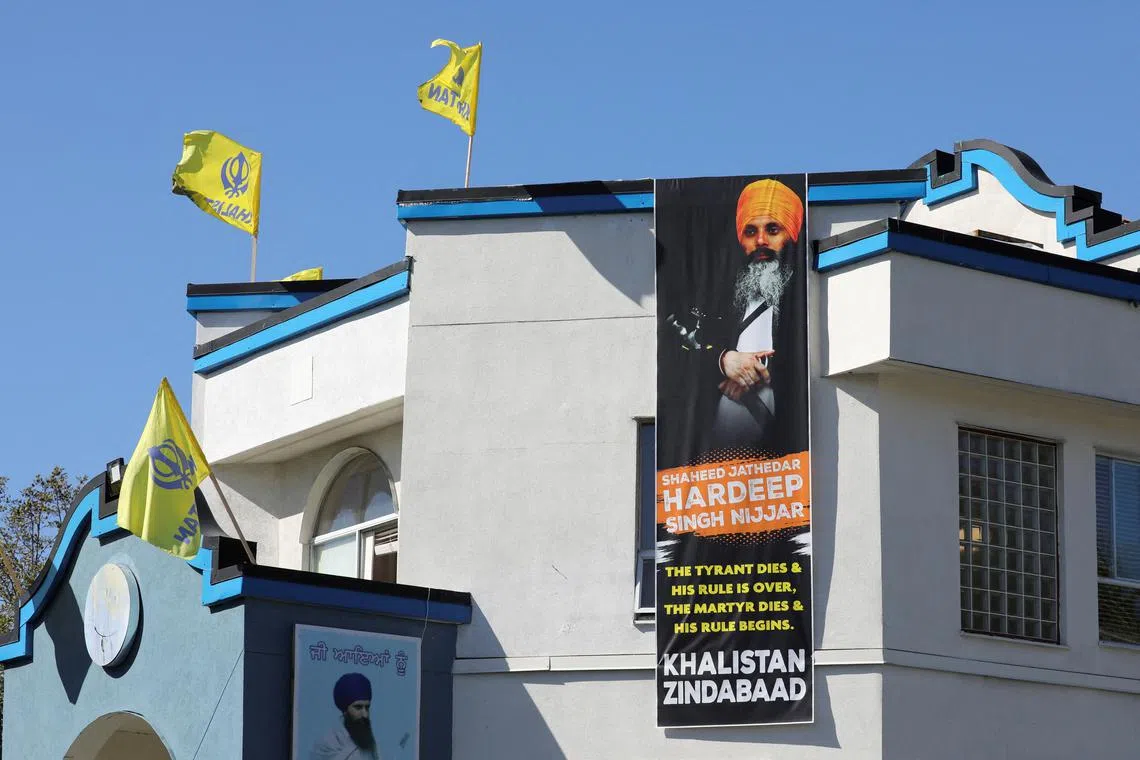Trudeau rejects India’s denial of involvement in Sikh leader’s murder in Canada
Sign up now: Get ST's newsletters delivered to your inbox

Mr Hardeep Singh Nijjar was shot near a Sikh temple in suburban Vancouver, a city in western Canada, in June.
PHOTO: REUTERS
OTTAWA - Canadian Prime Minister Justin Trudeau on Tuesday firmly rejected the Indian government’s denial of any involvement in the murder of a Sikh dissident in Canada, calling on India to take his country’s allegations seriously.
“We are not looking to provoke or escalate,” Mr Trudeau told reporters in Ottawa, Ontario. “We are simply laying out the facts as we understand them, and we want to work with the government of India.”
On Monday, Mr Trudeau stunned Canadians when he told the House of Commons that “agents of the Indian government” had been behind the shooting in June of Hardeep Singh Nijjar.
He was shot near a Sikh temple in suburban Vancouver, a city in western Canada.
Mr Nijjar was a Sikh separatist leader and a Canadian citizen.
The prime minister offered no details to support his charge that a nation had ordered a political killing on Canadian soil.
He only cited “credible allegations” that had been pursued by Canadian security agencies for several weeks.
The agencies, noting the continuing police investigation into the killing and the need to protect intelligence gathering methods, have declined to offer any more details.
A Canadian government official, who spoke on the condition of anonymity to discuss sensitive information, said the intelligence had been gathered by multiple countries.
Canada is a member of the so-called Five Eyes, an intelligence alliance that includes the United States, Britain, Australia and New Zealand.
India has long claimed that Canada is harbouring Sikh terrorists.
New Delhi says they are plotting from abroad to fracture the Indian state by providing funding and planning to create a separate Sikh nation called Khalistan within India’s Punjab region.
Mr Nijjar was active in that independence movement.
He had been a key organiser in rallying community members in the Canadian province of British Columbia to vote to establish Khalistan.
The non-binding vote, organised by a Washington, D.C.-based non-profit group called Sikhs For Justice, is being held in multiple cities around the world.
“I am a Sikh nationalist who believes in and supports Sikh’s right to self-determination and independence of Indian occupied Punjab through a future referendum,” Mr Nijjar wrote in an open letter in 2016.
Sikhs For Justice has collected about 1.1 million ballots since it launched the voting campaign in 2021, said Mr Gurpatwant Singh Pannun, its founder.
Mr Pannun said that he spoke to Mr Nijjar the day before he was killed.
In Mr Nijjar’s last speech at the temple, on the night of his murder, he urged its member to turn out at the vote on Sept 10, Pannun said.
“He did say that, ‘I’m not sure if I’ll be alive by that time this voting happens, but I want the community to make sure that they vote,’” Mr Pannun said. More than 135,000 Sikhs voted, he said.
Mr Pannun said Mr Nijjar had told him that he was approached by the authorities in July 2022 and twice in the spring of 2023 and warned that there was a threat to his life. They advised that he relocate and avoid being at the temple, he said.
Mr Nijjar’s participation in the movement for an independent state was prominent in India’s adamant denial of involvement on Monday.
The Indian foreign ministry said it rejected “any attempts to connect the government of India” to Mr Nijjar’s killing.
But it also took the opportunity to admonish Canada, accusing it of sheltering “extremists and terrorists” who “continue to threaten India’s sovereignty and territorial integrity”.
Mr Roland Paris, a professor at the University of Ottawa and a former foreign policy adviser to Mr Trudeau, said the allegations had created a sense of outrage and anger in Canada that crosses all political lines.
“It’s a stunning and appalling set of allegations,” Prof Paris said. “If it’s true that India was behind this killing, then it represents the most offensive and appalling form of political interference in a democracy that would parallel the behaviour of some of the worst authoritarian leaders in the world.”
On Tuesday morning in Surrey, British Columbia, people came to offer prayers and join in a meal service offered at the temple where Mr Nijjar was president, the Guru Nanak Sikh Gurdwara.
The previous evening outside the temple, Mr Nijjar’s son, Balraj Singh Nijjar, said his father’s death remains a fresh wound for his family.
“He had even called home like five minutes before it happened to get dinner ready,” his son said, speaking to reporters outside the temple. “It was kind of a big shock.” NYTIMES


